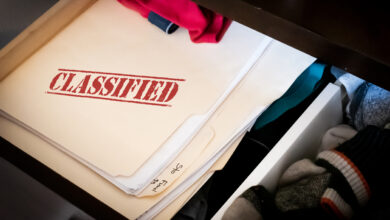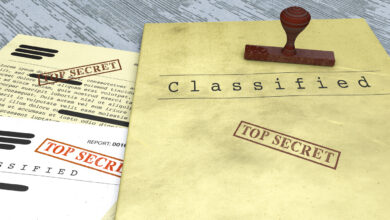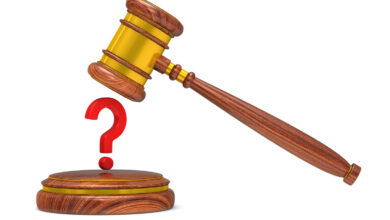Trump Falsely Accuses Hillary On Uranium One Deal
Virtually every word of Trump’s accusation is a lie.
Since the early days of his presidential campaign, Donald Trump has called out Hillary Clinton for her supposed role in the 2010 sale of a Toronto-based company called Uranium One to a Russian corporation.
Trump claimed that Clinton “gave up 20 percent of America’s uranium supply to Russia” in the deal. In case anybody wasn’t clear about the grave import of this accusation, Trump added, “You know what people do with uranium, don’t you? It’s called nuclear. Twenty percent. They could have never done it without her.” He has called it “collusion,” and likened it to Watergate.
As if it weren’t enough that Clinton gave away a big chunk of our nuclear stockpile to Russia, Trump claimed that she did it for money. According to Trump, Hillary Clinton’s State Department approved the transfer of 20 percent of “America’s uranium holdings” to Russia, while nine investors in the deal funneled $145 million to the Clinton Foundation.
This charge against Clinton has now re-emerged, bigger than ever, as a diversion from Trump’s own, very real Russia problems. Two of Trump’s key congressional apologists, Devin Nunes and Trey Gowdy, have announced that they will investigate the claim.
The White House has also confirmed that Trump discussed the issue with his White House counsel, who then conveyed Trump’s position to the Justice Department. In a laughable display of phony modesty about presidential influence, the White House insisted that the Justice Department made its own decision to launch an investigation, untainted by the president telling them to do so.
In case you’re wondering why Hillary Clinton would sell one-fifth of our uranium to Russia in exchange for a big charitable contribution, you might be interested to know that virtually every word of Trump’s accusation is a lie.
1. The United States didn’t transfer any uranium to Russia.
Contrary to Trump’s claim that Clinton gave up 20 percent of “America’s uranium supply” to Russia, and that the State Department “approved the transfer of 20 percent of America’s uranium holdings to Russia,” the United States didn’t sell, give away or transfer a single ounce of uranium to Russia in the Uranium One deal. The U.S. government wasn’t even a party to the deal.
Rather, a Russian government-controlled energy company, Rosatom, purchased a controlling interest in a Toronto-based private company, Uranium One, that owns mines, mills and land in the United States.
While Uranium One’s properties may account for approximately 20 percent of America’s uranium production capacity, it does not control anything close to 20 percent of America’s uranium “supply” or “holdings.” And even if the Russians had purchased 20 percent of our uranium stockpiles, which they didn’t, they would be unable to take any of it out of the United States because they do not have an export license.
And even if Rosatom could export uranium mined from Uranium One properties, which it can’t, it would be a drop in the uranium ocean. Uranium is produced and used all over the world, mostly to generate electricity at nuclear power plants, and it is not in short supply. To the contrary, the world is awash in it. According to one energy expert, “We have more uranium than we need for hundreds of years of nuclear power.”
The worldwide uranium glut is well documented. According to the Energy Minerals Division (EMD) of the American Association of Petroleum Geologists, which monitors the uranium industry, the price of uranium has been depressed for years by “a condition of oversupply.”
So the entire uranium “scandal” is based on a lie. America didn’t give up any of its uranium stockpile to Russia, much less 20 percent of it.
2. Hillary Clinton had nothing to do with the Uranium One deal.
However one chooses to characterize the sale of Uranium One to Rosatom, Hillary Clinton had little, if anything, to do with it.
Neither the State Department nor any other agency of the United States government was a party to the transaction, or even approved it.
The United States government only touched the transaction because it was reviewed by The Committee on Foreign Investment in the United States, commonly known as “CFIUS.” CFIUS is an interagency committee of the United States government that reviews the national security implications of foreign investments in U.S. companies or operations. Uranium is considered a strategic asset, so the Uranium One deal was reviewed for security implications by CFIUS.
CFIUS is chaired by the Secretary of the Treasury, not the Secretary of State, and includes representatives from 16 other U.S. departments and agencies, including Defense, State, Commerce and the Department of Homeland Security.
An in-depth report by the New York Times on the Uranium One deal noted that the primary security issue at stake in the CFIUS review of the deal was not nuclear proliferation. Rather, it was American dependence on foreign uranium sources. Given the worldwide glut of uranium, and the inability of Russia to export any uranium developed by Uranium One, it is not surprising that CFIUS concluded that the deal posed no security threat.
The Uranium One deal was no secret within the government. Four members of the House signed a letter expressing concern, and others proposed legislation to kill it. The Nuclear Regulatory Commission responded to those concerns, assuring the critics that American uranium would be preserved for domestic use.
To date, nobody has produced a shred of evidence that Hillary Clinton played any role whatsoever in the CFIUS review, or that it even rose to her attention. Yes, the State Department was one of the 17 government agencies represented on CFIUS, but cabinet officials rarely, if ever, participate in the review process. Not a single person has claimed that Clinton urged anybody to approve the deal, or had any role in it whatsoever.
And by the way, CFIUS didn’t even have the authority to approve or veto the deal. While CFIUS could object, only the president could veto it.
3. There’s no connection between the Uranium One sale and the Clinton Foundation.
Given Hillary Clinton’s lack of participation in the Uranium One transaction, it hardly matters who made donations to the Clinton Foundation.
Still, it would be disingenuous to ignore the large donations made to the Clinton Foundation by individuals connected to Uranium One. It looks terrible for a charitable foundation controlled by the family of the Secretary of State to accept donations from foreign interests who have business with the United States. That’s fair criticism.
But that criticism is for political tone-deafness and indifference to appearances. In the absence of any evidence of a quid-pro-quo, especially where Hillary Clinton wasn’t even involved in the decision-making process, tone-deafness isn’t corruption, much less criminal activity.
There is no scandal here.
Just another dishonest attempt by Donald Trump to divert attention from his own Russia problems.




